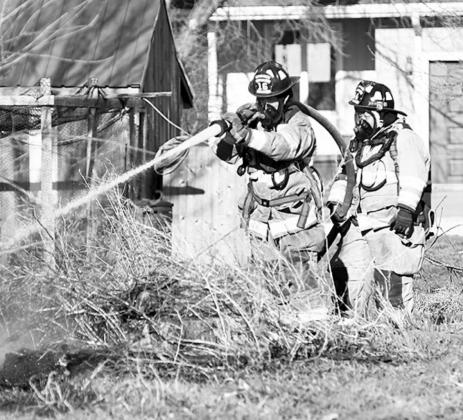■ Chief Cox airs concern with ability to respond to calls
Aurora Fire Chief Tom Cox agrees that although the roster number at the Aurora Fire Department has stayed relatively the same in recent years the department still needs more volunteers -- especially those readily available to respond.
“For the last 10 years or so it has been normal,” Cox said of the number of active members. “Maybe a little on the downside, but we’ve been as high as 40.”
When he first joined the department around 25 years ago there were approximately 25 on the crew, he added, but when the call came all 25 of those individuals would usually show up to the call. Times have since changed.
“They all lived in town, they all worked in town and all the businesses that they worked for let them leave to go to calls,” he said.
All of the current department’s 34 members live in Aurora, Cox noted, as that is a requirement to join and serve. However, even that could be changing, he said. There have been talks about expanding the residence requirement out to include the rural fire district. The matter needs to be discussed and voted on as a department, which has yet to happen due to COVID-19 gathering restrictions.
“But (now) we’ve got guys -- a lot of guys as a matter of fact -- that don’t work here in town,” he said. “And some of the guys that do work here, the businesses won’t let them leave to go on a call. So the scary thing is that we’re getting emergency calls and maybe only getting three or four guys in the middle of the daytime. And on a fire you need at least six guys, at least for one truck.”
A rural fire call needs at least six responders, plus more to drive the tankers with water to the scene, Cox explained. Add 100-plus degree temperatures, a raging fire and pounds and pounds of gear and the need for more responders on scene grows.
“You need guys to back those guys up because they can’t stay in their gear and work,” he said. “Twenty years ago we’d get 25 guys on that call, today (we’d get) four, five, maybe six. We can’t get the numbers, especially during the day -- even at night sometimes -- to run a call safely.”
For a motor vehicle accident, Cox said he’d like to be able to roll two trucks, with at least five members on each.
“Then, especially if you go out on the interstate, you’ve got guys that can work and you’ve got guys that can lookout for those that are working,” he said. “And also (relieve) them when they get tired.”
A structure fire could use 15-20 individuals, minimum, he voiced.
“If we got to a structure fire and I get seven or eight I am instantly mutual aiding other departments in the county,” Cox reported. “Then you’re waiting for them to get there in order to do what we need to do.”
Cox joined the department in 1992, while Assistant Fire Chief Glenn Obermeier joined in 1977. Both agreed that they’d seen the department, desire to volunteer and community involvement/support change over the years -- for better or worse.
“One thing that I would like to see is the business owners in town give more thought to having people from their employment be able to respond to a fire department call,” Obermeier said.
“And to be able to respond during the day,” Cox added.
“There are a number of places here in town that used to have three or four as members of our fire department, and right now we don’t have (hardly) any,” Obermeier concluded. “I would like to see that rebuild again.”
Cox noted that in his opinion Aurora has become what he calls a “bedroom community” filled with individuals who live locally, but work out of town. This is another contributing factor to low roster numbers, he added.
Both men agreed that there are obvious, drastic differences between a paid department, like ones in Grand Island and other larger communities, and that of the volunteer teams around the state, which Cox also explained are in the same boat Aurora is as far as numbers and participation goes.
“That’s kind of the scary thought is, I don’t want to pay those kind of taxes,” Cox said, noting he knows how expensive paid departments can be as he is a firefighter in Grand Island by day. “I know how much that costs and we don’t want that in Aurora by any means.”
But again Cox brought the conversation back to his desire for local businesses to promote joining the department and support individuals who are already on or decide to join by letting them to respond to incidents during the work day.
“Like Glenn said, the businesses need to take some of this load and say, you know, here’s a 20-something year old, ‘Why don’t you think about joining the fire department? We will support you, we will let you go,’” he said. “Because if that doesn’t happen eventually the taxes are going to go up because somebody needs to respond to those calls.”
The potential of responders not showing up is “the scary part,” Cox noted.
“First of all, people could get hurt,” he said. “Buildings could get lost. Eventually the city is going to say ‘Hey, we can’t rely on these guys and we’ve got to do something.’”
Though the fire crew will arrive and the situation will be handled, Cox noted that certain situations that could have been avoided sometimes happen due to the lack of people on scene.
“Will I say we have not done certain things that could have probably stopped the structure fire or the fire quicker?” Cox said. “Yeah, we haven’t done it -- because we haven’t had the manpower. However, I won’t allow -- and I can assume Glenn won’t allow -- a guy to go in and risk himself if we don’t have enough personnel. We get the job done -- safely -- it just takes longer and we lose more property.”
There is a potential risk to lives too, he confirmed, though he also noted that the Aurora department and its members are always safe and careful when responding.
“That’s what we want to stress,” Cox continued. “We need more manpower. We’ve got the equipment, I mean the community, the city and our rural board have done great things for us. They’ve donated financially, the community’s donated money and we appreciate that. We don’t want to take anything away from that. We appreciate the financial support, but we need manpower.”





